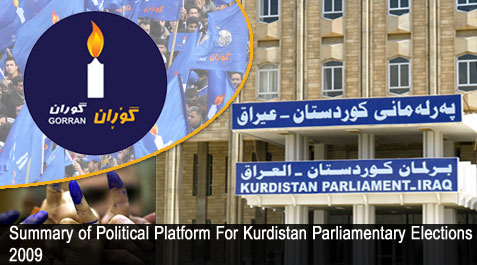
Change List
Summary of Political Platform For Kurdistan Parliamentary Elections 2009
Definition:
The Change List is a political entity that consists of a group of people sharing a common political program and seeking, through peaceful competition for power and free democratic elections, to win the trust of the general public and to represent the citizenry in the Iraqi Kurdistan Region's Parliament as well as in other representative councils on both the Iraqi national and the Kurdistan regional levels, with a view to furthering the List's agenda through government institutions. The goals the entity seeks to accomplish fall into the following main domains:
In the political and legal domains
The list aims to:
• Amend the Kurdistan Region's daft constitution in such a way as to ensure more rights and freedoms within the framework of a parliamentary democracy based on administrative decentralization.
• Support the rule of law and enhance the principle of keeping the Legislative, the Executive and the Judiciary branches of power separate, while consolidating the independence of the judiciary.
• Activate the role of Parliament in terms of ensuring accountability, monitoring government performance and voting government officials out of office when necessary.
• Determine the powers of the political parties and their activities as political organizations boasting no militias or private secret services, underscoring that ruling parties have the right to form cabinets and execute their governance plans, but they have no right to monopolize public wealth, utilize public office for political purposes or use bribery to sway voters, nor do they have a right to intimidate or discriminate against the citizenry.
• Activate the political, administrative and civil roles of women and the youth in all walks of life.
• Enhance the security system and introduce the reforms required to ensure unbiased security apparatuses that will support the rule of law, away from any narrow partisan, political or local loyalties.
• Demarcate the geographical boundaries of the Kurdistan Region, agree on a formula for the distribution of powers between the central government in Baghdad and the Kurdistan Regional Government [KRG] and respect the exclusive powers of the federal government, in addition to seeking to resolve outstanding issues between the two sides concerning the rights of Kurdistan people and the status of the disputed areas according to the Iraqi Constitution.
• Combat fanaticism, terrorism and extremism, and bar any discrimination against citizens on the basis of religion, sect, ideology or gender, nor on partisan affiliation or social position.
In the domain of economic and administrative reforms
The list aims to:
• Guarantee the transparent disclosure of the sources and details of the Kurdistan Region budget as well as the way funds are allocated to various sectors and areas.
• Revitalize the government through streamlining government institutions and harnessing electronic technology to ensure more active administrative relations.
• Salvage the economy and protect public wealth from monopoly and corruption, in addition to encouraging investment and boosting productivity in the areas of agriculture, industry and animal husbandry.
• Draw up strategic plans to reform and modernize educational and public health institutions.
• Hone plans for strategic projects in the fields of housing, electricity, roads and railways, oil and gas, water and sewerage, and dams and bridges.
In the domains of social justice and human development
The list aims to:
• Take action to address the crises of poverty and unemployment at both individual and familial levels, allocating 5% of the Region's budget to this end.
• Cater for the new generation through the physical, intellectual and technical rehabilitation of the young, which entails developing the sports sector and creating job opportunities for young people in the private, public and mixed sectors.
• Establish equitable healthcare and social security systems to support civil servants and citizens working in the private sector, as well as those affected by wars or by social, political, economic and health crises.
• Maintain a happy balance in the reconstruction, rehabilitation and development of Kurdistan areas, addressing the problem of poor services in villages, makeshift residential compounds and border areas, with areas sustaining damage or boasting natural resources given priority over others.
• Conduct a fair revision of the current scale of salaries, pensions, allowances and privileges, setting a fixed ceiling for the special material privileges enjoyed by top government officials and their bodyguards, with a view to establishing greater social justice.
• Combat all forms of physical and psychological violence and discrimination against children, women, individuals with special needs, the elderly, the disabled and the marginalized segments of the community.
• Provide job opportunities, coupled with a favourable environment for businessmen, professionals, freelancers, workers, farmers and other productive segments of the community at large to go about their work.
In the civil, cultural and environmental domains
The list aims to:
• Support and encourage cultural, artistic and free media projects; and to protect and renovate antiquities, ancient monuments and historical sites.
• Develop a culture of free, critical thinking and promote freedom of the media so as to ensure free access to information, unobstructed by legal obstacles and unaffected by partisan or official pressures.
• Liberate civil society organs, trade unions and non-governmental organizations [from external pressures].
• Protect the environment and promote the culture of environmental preservation in terms of tackling the risks of pollution in the Kurdistan Region as well as global warming as a global crisis.
• Protect natural forests, trees and wild birds and animals; and expand the areas covered by gardens and green patches, in addition to revitalizing and modernizing the tourist sector.